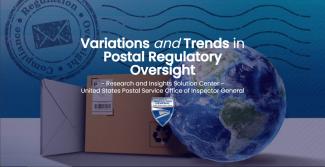Variations and Trends in Postal Regulatory Oversight
- Unlike most of its international peers, the Postal Regulatory Commission (PRC) only oversees the postal sector rather than multiple sectors. Further, it is unique in that it oversees only one entity, the Postal Service, and not the entire postal sector.
- The U.S. postal regulatory framework is different in that the national post itself can set most universal service parameters. In most other countries, the national legislature — and in some rare cases, the regulator — defines specific parameters such as service quality targets or the minimum number of post offices.
- The PRC oversees pricing for a comparative large percentage of mail and parcel volume, but in other areas of postal regulation, its oversight responsibilities are narrower than that of many of its peers.
- As the letter market shrinks and parcel competition increases, global policymakers are working to determine what type of regulatory intervention will be necessary to ensure universal and affordable postal service provision in the future. The U.S., however, has not made significant changes to the postal regulatory framework since 2006 and is not formally pursuing such reforms.
Postal markets around the world are transforming. Letter mail volume is declining while the parcel sector becomes increasingly competitive. These trends are placing significant financial pressure on national posts and their ability to sustain the provision of universal postal services. These trends have inspired discussions in many countries about how postal regulatory frameworks might adapt to a new market reality. In this paper, the U.S. Postal Service Office of Inspector General (OIG) examines the main oversight activities of the Postal Regulatory Commission (PRC) in the U.S. and other postal regulators in selected countries with developed postal markets. The paper also explores challenges and trends affecting postal regulation and regulatory oversight.
The purposes of the PRC and other postal regulators include ensuring continued delivery of universal, affordable postal services and sanctioning violations of laws and regulations. The structure, staffing, and scope of oversight of these regulators vary considerably from country to country. The U.S. is unique among countries we researched in that the standalone postal regulator, the PRC, oversees only one entity—the U.S. Postal Service. In other countries, postal regulators generally have some oversight role over delivery companies in addition to the national post.
A major task for all postal regulators is overseeing implementation of the universal service obligation, or USO. The USO is the collection of requirements ensuring that the universal service provider – normally the national post – provides all users a minimum level of service at an affordable price. There are notable differences in postal regulators’ oversight of the USO, including: how the USO is defined, the scope of products covered by the USO, the type and extent of price controls, and powers to enforce rules and regulations.
Postal regulators, including the PRC, are also involved in oversight activities related to market access and competition. The PRC and other postal regulators play a role in preventing revenue from certain products from covering the costs of other products, which would otherwise allow the national post an unfair advantage in the competitive marketplace. However, unlike other postal regulators in our comparison set, the PRC does not have a role in granting authorizations and licenses to national posts and delivery companies. Finally, the PRC is the only regulator studied for this paper that approves contracts between the national post and a mailer for customer-specific rates, fees, or terms of service.
In light of the dramatic changes occurring in postal markets, countries face several significant challenges related to postal regulation going forward. Policymakers in developed postal markets are engaging in political discussions about the future of postal services. Some countries are cutting the number of delivery days or lowering service performance. Changes to a country’s USO are likely to impact the scope of oversight and regulatory activities of regulators.
Tristan Dreisbach, Rick Schadelbauer, Jean-Philippe Ducasse, and Paola Piscioneri contributed to this report.






